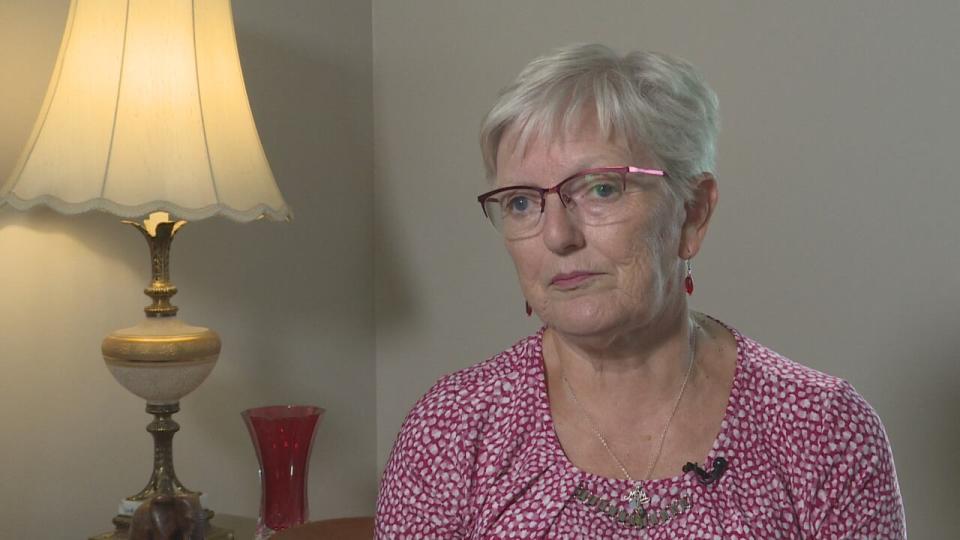Bill to give police power to arrest people for trespassing draws skepticism

A plan to give peace officers the power to arrest people for trespassing is being met with skepticism by some and hope by others that it will help address issues business owners have faced around panhandling and loitering on their property.
On Tuesday, Public Safety Minister Kris Austin introduced a bill in the legislature he says would give police and bylaw officers "more teeth" to enforce the province's Trespass Act.
Bill 7, an Act to Amend the Trespass Act, would give peace officers not just the ability to arrest people suspected of trespassing, but would also give them the authority to arrest someone who has recently left a property they are suspected to have trespassed on.
"I think it's a little bit too simplistic in terms of a solution," said John Wishart, CEO of the Chamber of Commerce for Greater Moncton.
"It's part of a solution, if it can be executed right, but we need those more fundamental things like mental health, addiction [services] and affordable housing, essentially to really make it work."

Public Safety Minister Kris Austin says proposed amendments to the Trespass Act will give police and bylaw officers more power to enforce the act. (Mikael Mayer/Radio-Canada)
Speaking to reporters after introducing the amendments, Austin said they were prompted in part by complaints from business owners in urban areas who feel enough isn't being done about people occupying the doorways to their stores and other areas of their property.
"Businesses are frustrated because the police don't have the clarity of legislation to be able to issue citations or to be able to, you know, do what needs to be done to get these people off the property," Austin said.
The intent behind this, he said, is "to clarify what it means to trespass, and to ensure that both bylaw enforcement and police have what they need to do their job."
Social services first
Asked if it's fair to target people seeking shelter in doorways who are not bothering anyone, Austin said the issue is a bother to business owners.
"I get emails regularly from business owners that say they're finding needles on their doorsteps, they're finding feces and vomit on their front doors, and business owners, they're trying to run a business."
Wishart said he has heard of similar experiences from businesses in the Moncton area and understands Austin's intent to address that issue.
However, he said he's concerned the new powers will put added pressure on police and bylaw enforcement officers.
He said he also thinks there are social services that should be bolstered first, before giving police more powers under the Trespass Act.
"This provincial government just recorded a $1-billion surplus," he said
"Surely we have the fiscal capacity to spend some on affordable housing, mental health and addiction services, along with beefing up our our Trespass Act. So I think that's a big missing element in the provincial response."
Asked Tuesday about spending on social supports to better address the issue, Austin said his government has a minister "working on housing" and another minister responsible for addictions and mental health, who is "aggressively working on addiction recovery for people" facing it.
CBC News asked for interviews with the Fredericton and Saint John chambers of commerce.
In an emailed statement, Morgan Peters, policy manager with the Fredericton chamber, said his organization has heard more and more concerns from members about thefts, trespassing, violence and public drug use.
""Each level of government has levers at their disposal, and we hope they use them," he said. "We haven't had time to fully evaluate and understand Bill 7, but what I can tell you is that we certainly hope reducing criminal acts against small businesses continues to be an active conversation."
Saint John Chamber of Commerce CEO David Duplisea said, in an email, his organization has heard from businesses that they are struggling with what appears to be rising crime in theft and vandalism.
Amendments misdirected, say addiction workers
Ensemble Moncton offers harm-reduction services to people struggling with addiction, and executive director Debby Warren said she thinks efforts to amend the Trespass Act are misdirected.
Warren said some of her clients have "high-acuity" needs due to mental health conditions, however, the housing to cater to those needs isn't available.

Debby Warren, executive director of Ensemble Moncton, says the provincial government should focus its efforts instead on improving access to mental health and addiction services. (Alexandre Silberman/CBC)
"[Austin's] legislation isn't going to change anything. The people that we serve will still be unhoused. They'll have to go someplace to sleep," Warren said.
"And so, you know, bylaw officers can come and tell them to move, but where [do] they go?"
Dr. Sara Davidson, medical director at River Stone Recovery Centre in Fredericton, said she thinks the proposed amendments are further "attempts at regulating homelessness" through the legal system.
"What we're being left with is these blunts approaches of trying to make homelessness go away through legal means, but it's really going to create a lot of suffering," she said.
Davidson said with the province reporting large budget surpluses, some of that money should be invested "heavily" into creating more affordable housing for people struggling with homelessness.
Arrest won't be first option: police rep
The proposed amendments come after Austin toured the province this past summer to consult local police departments on a multi-faceted plan he has to reduce crime in New Brunswick.

Gary Forward, Woodstock police chief and president of the New Brunswick Association of Chiefs of Police, says the problem of homeless people trespassing on property is an issue that can't be solved by police alone. (Jacques Poitras/CBC)
Gary Forward, president of the New Brunswick Association of Chiefs of Police, said there has to be care taken when giving police new powers to arrest, and he thinks calls for such issues would require assistance from more than police officers.
"I think what the police have been — and continue to try to improve upon — is forming partnerships with other professionals and experts to try to deal with some of the the social challenges that have certainly come to light in in the last two years," he said.
Forward said he hopes that if officers end up with the power to arrest people for trespassing, that it's not the first option they turn to when responding to a call.
"My sense and hope is that nobody would simply [resort] to a legislative outcome or enforcement without first taking the necessary steps to perhaps gather information that could be used to consult, call or bring out associated partners that may be in a better position to assist that individual."
The Trespass Act does not list specific fine amounts for people convicted of a violation.
However, anyone convicted under the act can be ordered to financially compensate the complainant for loss of or damage to property suffered during the commission of an offence.


